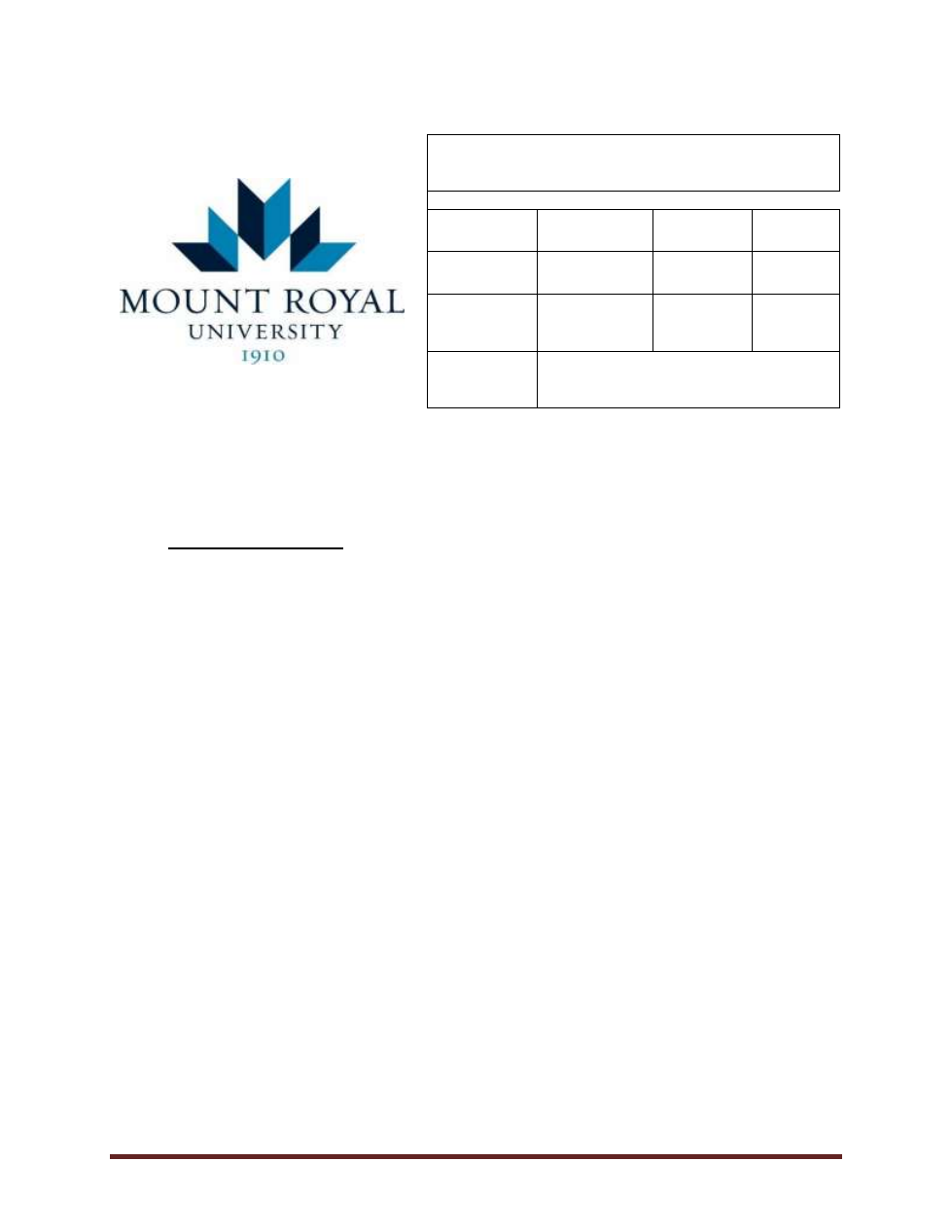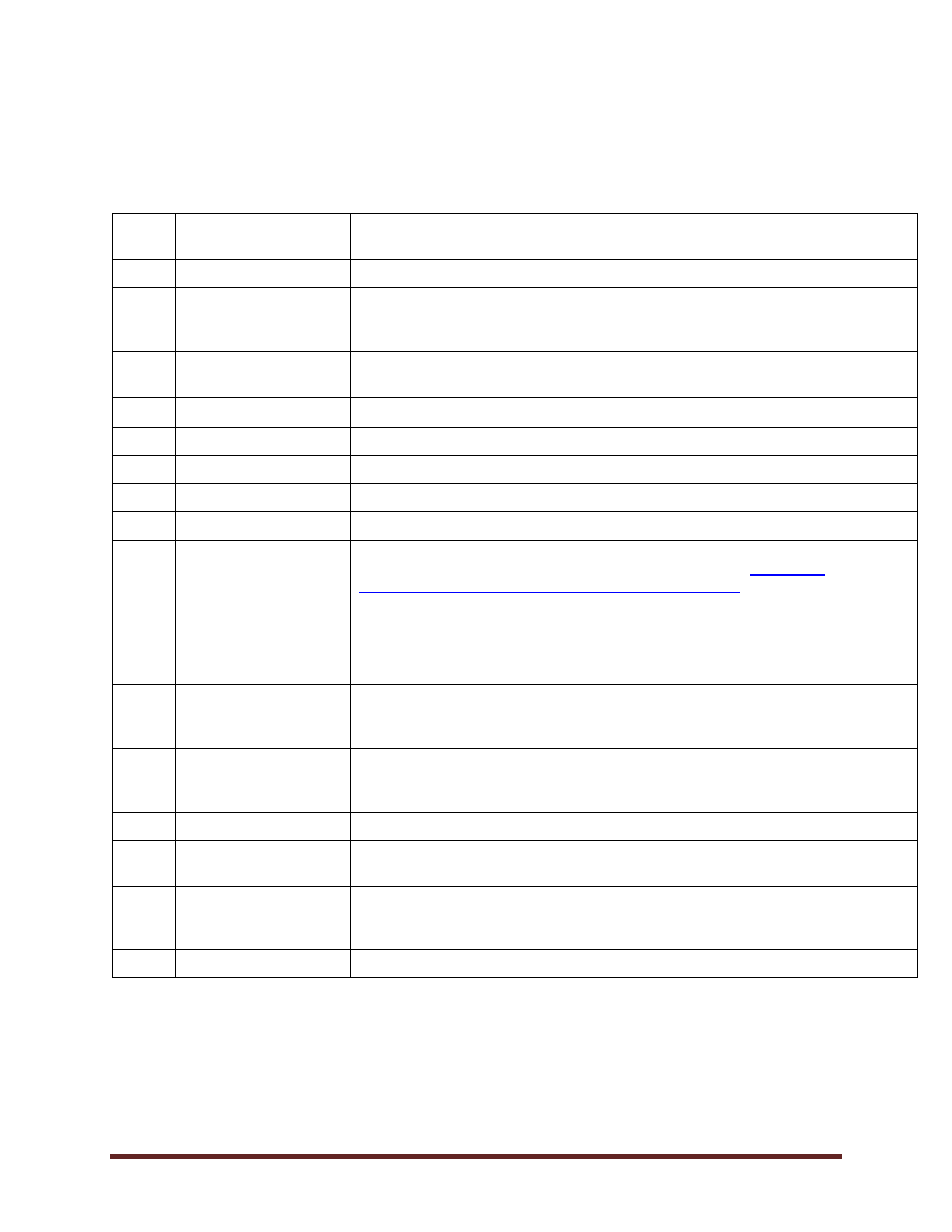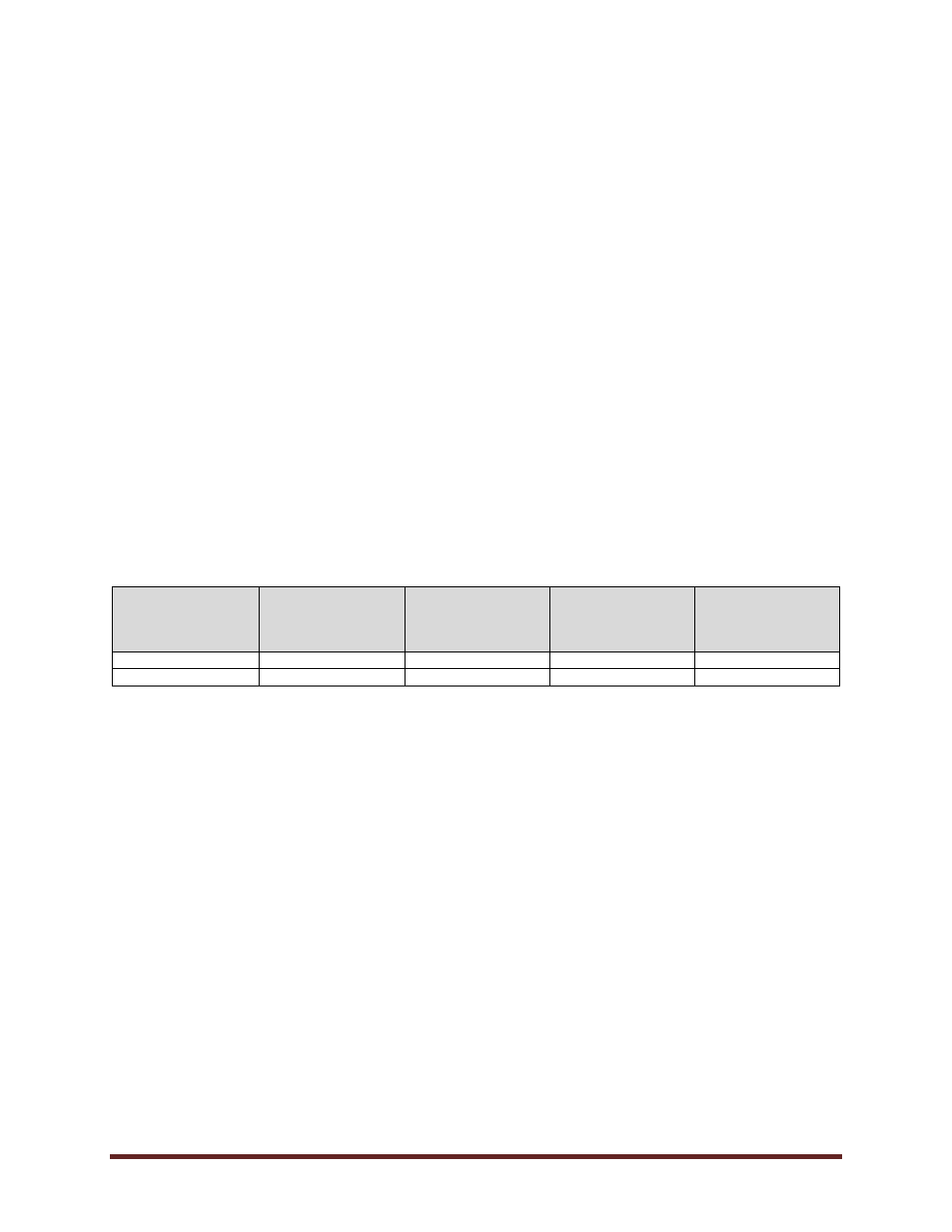
Procedure for Addressing Allegations of Misconduct in Research
Page 1 of 13
PROCEDURE
FOR
ADDRESSING
ALLEGATIONS
OF
MISCONDUCT
IN
RESEARCH
Procedure
Type:
Academic
Initially
Approved:
February 17,
2023
Procedure
Sponsor:
Provost & VP
Academic
Last Revised:
Primary
Contact:
AVP, Research,
Scholarship and
Community
Engagement
Review
Scheduled:
February 17,
2028
Approver:
General Faculties Council
A. PROCEDURES
1.
General Processes
Confidentiality of Process
1.1.
The process of assessing allegations of Misconduct inherently involves sensitive personal
information about Researchers and others who contribute to or participate in Research.
1.2.
While the University will use its best efforts to maintain the privacy of those who participate
in the process, a fair assessment of allegations of Misconduct requires some sharing of
personal information.
1.3.
Information about the allegations of Misconduct, the process for assessing the allegations
and the outcome of the process must only be shared to the extent required to ensure a fair
process as articulated in the Policy and Procedure.
1.4.
Where Research involves humans as participants and requires Human Research Ethics
Board (HREB) review, the HREB Chair will be informed as required at the appropriate steps
in this process.
1.5.
Individuals who participate in the process are expected to keep any personal information
that they receive through their participation in the process confidential.
1.6.
Respondents must receive sufficient information about the allegations of Misconduct in
order to allow them to fully and fairly respond to those allegations.
1.7.
The AVP, RSCE will inform the Complainant as the allegation of Misconduct proceeds to
the next phase in the process, and, once determined, whether the allegations were
substantiated, partially substantiated or unsubstantiated. The Complainant will not receive
the written decisions or reports of the AVP, RSCE, the Investigator, the Investigation
Committee or the Provost.

Procedure for Addressing Allegations of Misconduct in Research
Page 2 of 13
Timelines
1.8.
The University will endeavour to address allegations of Misconduct in a prompt, diligent
and timely manner while ensuring that the fairness of the process for all participants is
maintained. The Respondent will be kept apprised of the anticipated timelines.
1.9.
The Inquiry phase must be concluded within two months of the receipt of the allegation of
Misconduct.
1.10.
The remainder of the assessment of the allegation of Misconduct must be concluded within
seven months of the receipt of the allegation of Misconduct.
1.11.
These timelines may only be extended:
a) with respect to Research funded by the Tri-Agency, in accordance with the Framework;
and
b) with respect to all other Research, where circumstances exist such that the allegation
of Misconduct cannot reasonably be assessed within these time periods, as
determined by the Provost in consultation with the AVP RSCE.
Support Persons
1.12.
The Respondent, the Complainant and any other party involved in a process may have a
support person present for any interview, hearing or other meeting. The support person,
who may be a member of the faculty or staff association, is able to provide personal support
but may not speak on behalf of the individual they are supporting. Support persons are
subject to the same confidentiality requirements as other participants.
Frivolous and Vexatious Allegations
1.13.
If at any stage in the assessment of the allegations of Misconduct it is determined by the
applicable decision maker that an allegation of Misconduct is frivolous or vexatious, the
allegation will be considered to be unsubstantiated and disciplinary action may be taken.
Frivolous or vexatious allegations are taken very seriously.
1.14.
Where an allegation of Misconduct is determined to be frivolous or vexatious, the decision
will be forwarded to:
a) for a Student complainant, the Office of Student Community Standards; or
b) for Employee complainants, the Office of Human Resources, for investigation as a
breach of section 3.7 of the Policy.
Interim Measures
1.15.
The AVP, RSCE may implement interim measures at any stage of addressing the
allegation of Misconduct. Interim measures may be implemented where the AVP, RSCE
(i) receives a request from the Tri-Agency to implement interim measures, or (ii) determines

Procedure for Addressing Allegations of Misconduct in Research
Page 3 of 13
that the allegation of Misconduct creates sufficient concern regarding health, safety or
financial risks that warrant the implementation of interim measures.
1.16.
Interim Measures may include, but are not limited to:
a) freezing grant accounts;
b) requiring a second authorized signature from an institutional representative on all
expenses charged to the researchers grant accounts;
c) suspending all or part of the Researcher’s Research (even if unrelated to the allegation
of Misconduct); and
d) restricted access to research spaces, for example, laboratories.
1.17.
Any interim measures should reflect that the allegations of Misconduct have not yet been
substantiated and should seek to only mitigate against imminent risks to health and safety
or financial risks.
1.18.
The AVP, RSCE should balance the potential health, safety and financial risks arising from
the allegation of Misconduct against the impacts of interim measures on the Respondent
and other Researchers. The AVP, RSCE will periodically review any interim measures
placed.
Multiple Allegations of Misconduct
1.19.
Where an allegation of Misconduct is made against multiple Researchers or multiple
allegations of Misconduct are submitted by different Complainants about the same
Research, normally these will be treated each as independent allegations of Misconduct
against each Researcher individually. However, prior to the assignment of an Investigator
under section 4.1, the AVP, RSCE may do any of the following:
a) split individual components of an allegation of Misconduct into separate allegations
of Misconduct, each considered independently against the applicable
Respondents;
b) combine the review of one or more allegations of misconduct made against two or
more Researchers into a single process; and
c) combine multiple allegations of Misconduct submitted by different Complainants
into a single process.
1.20.
In making this determination under section 1.19, the AVP, RSCE will consider and balance
the following interests:
a) the similarity between the nature of each allegation of Misconduct with respect to
each Researcher;
b) the privacy of the Researchers and others who may be engaged in the Research;
c) minimizing the need for the Complainants, Respondents and others to participate
and share the same information in multiple processes; and
d) ensuring that, where possible, decisions based on similar facts are consistent.
1.21.
The AVP, RSCE will inform the Respondents where the AVP, RSCE intends to take any of
the steps outlined under section 1.19, including providing a summary of the AVP, RSCE’s
consideration of the factors under section 1.20. The Respondents may provide feedback
to the AVP, RSCE, following which the AVP, RSCE will notify the Respondents of the
process that will be undertaken.

Procedure for Addressing Allegations of Misconduct in Research
Page 4 of 13
2.
Allegations
2.1.
Allegations of Misconduct must be sent to the AVP, RSCE in writing and will contain
sufficient detail to enable the AVP, RSCE to investigate the matter. The AVP, RSCE may
request that the Complainant provide further particulars regarding the allegation of
Misconduct.
2.2.
Allegations of Misconduct should be made promptly, though the University will consider all
allegations regardless of the time since the Research was performed. The time that has
passed since the date the alleged Misconduct became known or ought to have become
known may impact the University’s ability to proceed with an investigation.
2.3.
Allegations of Misconduct can be made anonymously. The ability of the University to
consider or investigate an allegation may be hampered if there is insufficient information in
the anonymous allegation of Misconduct. In these cases, the University may be unable to
proceed with an investigation.
2.4.
Where an allegation of misconduct is made against the AVP, RSCE or the AVP, RSCE has
a Reasonable Apprehension of Bias, whether real or apparent, the Provost may designate
another academic leader who will assume all of the responsibilities of the AVP, RSCE
under this Procedure.
2.5.
Where an allegation of Misconduct involves researchers at another institution, the AVP,
RSCE will contact the individual designated at that institution to manage allegations of
research misconduct and jointly determine the appropriate process to be applied.
3.
Inquiry
3.1.
The AVP, RSCE will conduct an initial assessment to determine the applicability of the
Policy to the alleged Misconduct. If the allegation is determined to not be subject to the
Policy, the AVP, RSCE will forward the allegations to the appropriate individual in
accordance with the applicable University policy.
3.2.
Upon determining an allegation of Misconduct is subject to the Policy, the AVP, RSCE will
provide the Respondent with a summary of the Complainant’s allegation, a copy of the
Policy and this Procedure and a letter explaining the process.
3.3.
The AVP, RSCE will conduct an inquiry into the allegation of Misconduct. The AVP, RSCE
will review the allegation of Misconduct and may meet with the Complainant, meet with the
Respondent or access University records.
3.4.
Where appropriate, the AVP, RSCE may engage in a process of early resolution. Early
resolution is appropriate where:
a) The Respondent admits to the Misconduct;
b) The Misconduct does not involve significant financial, health and safety or other risks;

Procedure for Addressing Allegations of Misconduct in Research
Page 5 of 13
c) Investigation is not likely to reveal further information about the alleged Misconduct;
and
d) The AVP, RSCE and the Respondent have agreed upon appropriate resolutions (as
set out in section 9).
3.5.
Where the AVP, RSCE and the Respondent agree on an early resolution, the AVP, RSCE
will draft, and the Respondent will sign, a written decision stating what Misconduct has
been admitted and the agreed resolution. Agreed resolutions will be carried out in
accordance with section 9.3.
3.6.
Where early resolution is either not appropriate or is unsuccessful and the AVP, RSCE has
concluded the inquiry, the AVP, RSCE will either:
a) if the AVP, RSCE determines that all of the allegations of Misconduct have no
reasonable prospect of being substantiated, find the allegations are unsubstantiated;
or
b) proceed with some or all of the allegations of Misconduct to the Investigation phase
set out in section 4.1.
3.7.
The AVP, RSCE will set out their decision in writing and provide a copy to the Respondent
and Provost. If the AVP, RSCE determines to proceed to the Investigation stage then they
will also provide a summary of the specific allegations that are proceeding to Investigation.
4.
Investigation Report
4.1.
If the AVP, RSCE determines that an Investigation is warranted, they (or a designate) will
conduct a preliminary investigation. The purpose of the preliminary investigation is to
compile and summarize the relevant information into an investigation report that will assist
the Investigation Committee in carrying out its function.
4.2.
The person conducting the preliminary investigation will be referred to as the Investigator.
The Investigator can be an Employee or an externally appointed Investigator. The
Investigator must have the necessary expertise to conduct the preliminary investigation
and may not have a Reasonable Apprehension of Bias, whether real or apparent.
4.3.
Once notified by the AVP, RSCE of the summary of allegations that are proceeding to
Investigation, the Respondent will be given a reasonable opportunity to provide a written
response.
4.4.
In addition to reviewing the Respondent’s written response, the Investigator will take
whatever steps they deem necessary for gathering information pertaining to the allegation.
This must include giving the Complainant and Respondent an opportunity to meet with the
Investigator. This may also include meeting with other witnesses or requesting records
from the Complainant, Respondent, other witnesses or accessing other University records.
Employees will assist the Investigator by meeting with the Investigator and providing
records that are requested.
4.5.
The Investigator must provide to the Respondent a general summary of any information
that they received in meetings with the Complainant or witnesses. The Investigator will
provide to the Respondent copies of any records that they have received in the course of

Procedure for Addressing Allegations of Misconduct in Research
Page 6 of 13
their investigation. The Investigator will provide the Respondent with an opportunity to
respond to any new information or records prior to concluding the preliminary
investigation.
4.6.
Once the Investigator is satisfied that they have collected all of the information and
records that are required for a full Investigation and the Respondent has been given an
opportunity to respond, the Investigator will prepare an investigation report.
4.7.
The investigation report will include, at minimum:
a) a summary of the specific allegations of Misconduct;
b) the process used by the Investigator to conduct the preliminary investigation;
c) a list of the records reviewed by the Investigator;
d) a list of the witnesses interviewed by the Investigator and a summary of their
evidence;
e) the Investigator’s analysis of the evidence;
the Investigator’s recommendation as to whether the allegation of Misconduct is
substantiated.
4.8.
Once finalized, the investigation report will be sent to the Provost, with a copy to the
Respondent.
4.9.
At any time during the investigation the Investigator determines that the allegation of
Misconduct no longer has a reasonable prospect of being substantiated, the Investigator
may conclude the investigation and make a finding that the allegation of Misconduct is
unsubstantiated. The Investigator will communicate this decision, including the
Investigator’s reasons, to the Respondent, the Provost and, if applicable, the AVP, RSCE.
5.
Investigation Committee
5.1.
An Investigation Committee will be appointed to assess the allegation of Misconduct and
determine, on a balance of probabilities, whether the allegation of Misconduct is
substantiated and the recommended actions arising from this finding.
5.2.
Upon receipt of the investigation report, the Provost will appoint an Investigation Committee
Chair. The Investigation Committee Chair must be an academic leader of the University,
typically a Dean.
5.3.
The Investigation Committee Chair will appoint two further Investigation Committee
members, at least one of whom will be external with no current affiliation with the University.
5.4.
The Investigation Committee must include members who have the necessary expertise.
Members of the Investigative Committee may not have a Reasonable Apprehension of
Bias, whether real or apparent. The Provost will advise the Respondent of the composition
of the Investigation Committee. The Respondent will have 7 calendar days to raise any
concerns with the composition of the Investigation Committee. The Provost will resolve
any concerns by:
a) maintaining the composition of the Investigation Committee,
b) asking the Chair of the Investigation Committee to replace a member of the committee;
or
c) replacing the Chair of the Investigation Committee and asking the new Chair to choose
two new committee members.

Procedure for Addressing Allegations of Misconduct in Research
Page 7 of 13
5.5.
Within 7 calendar days of the date the Provost advises the Respondent of the
composition of the Investigation Committee, the Respondent will submit a written
response to the investigation report to the Investigation Committee.
5.6.
The Investigation Committee may request further records from the Investigator,
Respondent, Complainant, other witnesses or accessing other University records.
Employees will assist the Investigation Committee by providing research records that are
requested.
5.7.
All documentation submitted to the Investigation Committee will be made available to the
Respondent. The Respondent will be given the opportunity to speak to the records at the
hearing.
6.
Hearing
6.1.
Once the Investigation Committee has collected all relevant records, the Investigation
Committee will conduct a hearing.
6.2.
The Investigation Committee will have authority over the process under which the hearing
will be conducted, provided that it is in compliance with the Policy, this Procedure and the
principles of procedural fairness.
6.3.
The Chair of the Investigation Committee will inform the Respondent in writing of the
following information:
a) the date, time and location of the hearing;
b) the purpose of the hearing;
c) an outline of the process to be followed; and
d) a request for the Respondent to inform the Investigation Committee if the
Respondent would like the Investigation Committee to call any witnesses to hear their
evidence directly.
6.4.
The following individuals may attend the hearing:
a) the Investigation Committee members, the Respondent, their support person and the
Investigator are entitled to attend the entire hearing;
b) witnesses and their support person may attend the hearing while they are providing
evidence to the Investigation Committee;
c) the Chair of the Investigation Committee will have authority to allow other attendees
or to modify how attendees participate (such as participating virtually) as may be
required to ensure fairness of the process;
6.5.
While all participants are expected to prioritize attendance at the hearing, the Chair of the
Investigation Committee may reschedule the hearing where participants are unavailable
for reasons that are acceptable to the Chair.
6.6.
The Respondent will be given a reasonable opportunity to attend the hearing. If the
Respondent refuses to attend or does not reasonably attempt to make themselves
available for a hearing, the hearing may proceed in their absence.

Procedure for Addressing Allegations of Misconduct in Research
Page 8 of 13
6.7.
The hearing should, at minimum, consist of the following:
a) an opportunity for the Respondent to provide their response to the allegation of
Misconduct, including the investigation report and any records collected by the
Investigation Committee;
b) an opportunity for the Investigation Committee to ask any questions of the
Investigator;
c) an opportunity for the Investigation Committee to ask any questions of the
Respondent;
d) an opportunity for the Investigation Committee to call any witnesses;
e) an opportunity for the Respondent to provide any final response to the information
presented to the Investigation Committee
6.8.
The Investigation Committee has full discretion regarding which witnesses will be called
at the hearing. While witnesses who spoke to the Investigator need not be called at the
hearing, the Investigation Committee may choose to do so where it perceives a benefit in
hearing the witness’ evidence directly.
6.9.
The Respondent may ask the Investigation Committee to call witnesses, though the
Investigation Committee is not required to do so. The Respondent should bring any such
request to the Investigation Committee promptly and with sufficient time for the
Investigation Committee to coordinate the witnesses’ attendance at the hearing.
6.10.
The Investigation Committee may adjourn and reconvene the hearing if the Investigation
Committee determines that it needs to collect further records or call further witnesses.
6.11.
Once the Investigation Committee has concluded the hearing, it will make its decision.
7.
Decision
7.1.
Upon conclusion of the hearing the Investigation Committee will write its decision. The
decision must, at minimum, include:
a) the composition of the Investigation Committee;
b) a summary of the specific allegations of Misconduct;
c) the investigation report;
d) the process used by the Investigation Committee to conduct its investigation;
e) a list of records reviewed by the Investigation Committee;
f) a list of the witnesses called at the hearing and a summary of their evidence;
g) the Investigation Committee’s analysis;
h) the Investigation Committee’s decision regarding whether the allegation of
Misconduct was substantiated; and
i) the Investigation Committee’s recommended actions arising from their finding.
7.2.
A copy of the decision will be provided within 14 calendar days to:
a) the Provost;
b) the AVP, RSCE;
c) the Respondent; and,
d) if the allegations of Misconduct are substantiated, the Respondent’s Dean; and,
i.
for employees, the Office of Human Resources; and
ii.
for students, the Office of Student Conduct.

Procedure for Addressing Allegations of Misconduct in Research
Page 9 of 13
7.3.
Acts of Misconduct may be intentional or unintentional and an allegation of Misconduct
may be substantiated where the Misconduct arose from oversight, scholarly incompetence,
carelessness or negligence. The Investigation Committee may consider the intention of a
Researcher as it makes its recommendations following substantiation of Misconduct.
8.
Appeal
8.1.
The Respondent may appeal to the Provost a finding by the Investigation Committee that
Misconduct was substantiated. Such an appeal can be made on the following grounds:
a) a procedural error occurred which materially impacted the procedural fairness of the
assessment of the allegation of Misconduct;
b) a member of the Investigation Committee had a Reasonable Apprehension of Bias; or
c) there is new information that was not available at the time of the assessment of the
allegation of Misconduct that would likely have impacted the Investigation Committee’s
decision.
8.2.
The Investigation Committee’s recommendations may not be appealed.
8.3.
Requests for appeal must be made in writing to the Provost within 14 calendar days of the
Investigation Committee’s decision being provided to the Respondent and must set out the
following:
a) identifying the grounds on which the appeal relies;
b) providing any information on which the appeal relies; and
c) describing what resolution is being sought.
8.4.
Upon receipt of a request for appeal, the Provost will notify any decision makers who have
received recommendations and request they pause action on recommendations until the
appeal has been resolved.
8.5.
The Provost will review the request for appeal. The Provost may meet with the
Respondent, Investigator, Investigation Committee members or any other individuals who
the Provost believes may provide relevant information. The Provost will provide the
Respondent with any new information they receive which was not contained in the
Investigation Committee’s decision and the Respondent will be given the opportunity to
respond to this information.
8.6.
The Provost will provide a written decision to the Respondent. If the Provost allows the
Respondent’s appeal, the Provost may:
a) request that the Investigation Committee reconvene to correct the procedural error or
hear the new evidence;
b) convene a new Investigation Committee; or
c) replace the Investigation Committee’s decision with the Provost’s own.
8.7.
The decision of the Provost is final.
9.
Recommendations Arising from Decision

Procedure for Addressing Allegations of Misconduct in Research
Page 10 of 13
9.1.
If an Investigation Committee decision finds the allegations of Misconduct are
unsubstantiated, the Investigation Committee will make recommendations for steps that
can be undertaken by the University to protect or restore the reputation of the Respondent.
Recommendations to Restore Reputation - actions that can be undertaken by the
University to protect and restore the reputation of the Respondent. These
recommendations may include:
a) at the Respondent’s request, communication to individuals involved in the assessment
of the allegation of Misconduct that the allegations were unsubstantiated; or
b) at the Respondent’s request, support the Respondent in continuing their Research and
making requests for extending Research deadlines where possible.
9.2.
If an Investigation Committee decision substantiates the allegation of Misconduct, the
Investigation Committee will make recommendations for steps to be taken to address the
Misconduct.
Recommendations to the Respondent - action that can be undertaken by the Researcher
in advance of University actions and which may mitigate disciplinary action of the
University. These recommendations may include:
a) correcting the research record and providing proof that the research record has been
corrected;
b) providing a letter of apology to those impacted by the Misconduct;
c) repaying funds;
d) withdrawing relevant articles, papers or other documents that have been submitted for
publication but not yet published; or
e) notifying impacted parties.
Recommendations to Notify Impacted Parties - that can be undertaken by the University.
These recommendations may include:
a) notifying publishers of any output of the Research of the Misconduct and requesting
withdrawal of such output;
b) notifying grant providers, including a Tri-Agency, of the Misconduct; or
c) notifying impacted parties of the substantiated Misconduct.
Recommendations for Disciplinary Action – disciplinary action that can be undertaken by
the University pursuant to:
a) applicable collective agreements;
b) student conduct policies;
c) employment terms and conditions; or
d) other contractual terms.
9.3.
The Investigation Committee’s recommended steps to address a finding of Misconduct
should be proportionate to the severity of that Misconduct. Where possible, the
Investigation Committee should seek to make recommendations that will minimize harm
arising from the Misconduct to others involved or participating in the Research.
9.4.
Where Misconduct may result in harm to others or brings the integrity of research
conducted at the University into disrepute, the University may inform other organizations
or individuals to mitigate against these harms. Where the University notifies others of the

Procedure for Addressing Allegations of Misconduct in Research
Page 11 of 13
substantiated Misconduct, the University will endeavor to balance the Respondent’s right
to privacy against the public interest in disclosing the Misconduct by only releasing as much
information as is required to mitigate against these harms.
9.5.
Recommendations of the Investigation Committee will be acted upon by the appropriate
decision maker as follows:
a) Recommendations to Restore Reputation will be coordinated by the AVP, RSCE. The
AVP, RSCE will consult with the Respondent prior to enacting any recommendations
which require the AVP, RSCE to communicate with other individuals.
b) Recommendations to the Respondent and Recommendations to Notify Impacted
Parties will be coordinated in consultation between the AVP, RSCE and the
Respondent’s Dean. Respondents should inform the AVP, RSCE and the
Respondent’s Dean of any corrective action they take in accordance with their
recommendations promptly. The AVP, RSCE and the Respondent's Dean will consider
steps taken by the Respondent when determining what action the University will take
pursuant to the recommendations.
c) Recommendations for Disciplinary Action will be coordinated:
i.
if for Students by the Office of Student Community Standards in
accordance with, as applicable, the Code of Student Academic Integrity
policy and / or the Code of Student Community Standards policy; or
ii.
if for Employees by the Office of Human Resources in accordance with the
Employee’s terms and conditions of employment, including any applicable
collective agreements.
9.6.
The applicable decision makers under 9.5(c) may consider any prior instances of
substantiated misconduct committed by the Respondent under this Policy or any other
University policy in considering and weighing the Investigation Committee’s
Recommendations for Disciplinary Action.
10.
Reporting
10.1.
The AVP, RSCE will advise the relevant Tri‐Agency and/or the Secretariat on Responsible
Conduct of Research in accordance with section 4.4 of the Framework with respect to any
allegation of Misconduct regarding Research funded by a Tri-Agency.
10.2.
The University, its Employees and Students may not enter into a confidentiality agreement
which would prevent the reporting of allegations of Misconduct in accordance with section
4.4 of the Framework.
10.3.
The AVP, RSCE will publish anonymized, statistical, annual reports to the University
community on confirmed findings of Misconduct.
10.4.
No record of an allegation of breach of research integrity shall be placed in the
Respondent’s personnel or student file except where disciplinary action is taken in
accordance with section 9.5(c) of this Procedure.

Procedure for Addressing Allegations of Misconduct in Research
Page 12 of 13
B. DEFINITIONS
(1)
AVP, RSCE:
the Associate Vice-President, Research, Scholarship and Community
Engagement
(2)
Complainant:
any person who makes an allegation of Misconduct
(3)
Employee:
means individuals who are engaged to work for the University under an
employment contract, including faculty, staff, exempt Employees and
Management Employees
(4)
Framework:
refers to Tri-Agency Framework: Responsible Conduct of Research (2021), as
amended
(5)
Investigator:
the person conducting the preliminary investigation as defined in section 4.2.
(6)
Misconduct:
as defined in Section 2 of the Policy
(7)
Policy:
refers to the Responsible Conduct in Research Policy
(8)
Procedure:
refers to this Procedure for Addressing Allegations of Misconduct in Research
(9)
Provost:
the Provost and Vice-President, Academic
(10)
Research:
research is an undertaking intended to extend knowledge through a disciplined
inquiry and/or systematic investigation as defined in the (
Tri-Agency
Framework: Responsible Conduct of Research (2021))
.
Research also includes activities related to one or more of scholarly or artistic
work which occurs through discovery, integration, teaching and learning, or
application of knowledge and is usually disseminated through peer-reviewed
processes.
(11)
Researcher:
any Employee, Student or individual affiliated with the University (e.g., research
associates, emeriti, adjuncts, visiting scholars, etc.) participating in Research at
or under the auspices of the University
(12)
Reasonable
Apprehension of
Bias:
a bias or other interest that would create a conflict that would rise to the level of
disqualifying an Investigation Committee member from fairly assessing an
allegation of Misconduct
(13)
Respondent:
an individual alleged to have committed Misconduct
(14)
Student:
means any individual who maintains an affiliation as a learner in the University’s
educational community
(15)
Tri-Agency:
means the Canadian Institutes of Health Research (CIHR), the Natural Sciences
and Engineering Research Council (NSERC) and the Social Sciences and
Humanities Research Council (SSHRC)
(16)
University:
means Mount Royal University
C. RELATED POLICIES
● Animal Care Policy

Procedure for Addressing Allegations of Misconduct in Research
Page 13 of 13
● Code of Conduct - Employee
● Code of Student Academic Integrity Policy
● Code of Student Community Standards Policy
● Ethics of Research Involving Human Participants Policy
● Responsible Conduct in Research Policy
D. RELATED LEGISLATION
● Alberta Freedom of Information and Protection of Privacy Act
● Canada’s Food and Drug Act
● The Canadian Environmental Assessment Act
E. RELATED DOCUMENTS
● Procedure for Conflict of Interest in Research
● Procedure for the Collection, Storage and Authenticity of Research Data
● Tri- Agency Framework: Responsible Conduct of Research (2021)
● Tri-Council Policy Statement: Ethical Conduct for Research Involving Humans (2018)
● Tri-Agency Research Data Management Policy
F. REVISION HISTORY
Date
(mm/dd/yyyy)
Description of
Change
Sections
Person who
Entered Revision
(Position Title)
Person who
Authorized
Revision
(Position Title)












